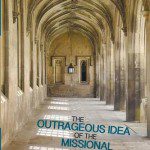By Seth Haines; part of a series at TheHighCalling.org called “Best Books for Business.” Stay tuned for more!
In the late nineties, I was force-fed a steady diet of business books by my business school professors. “Thinking like a businessman,” they said, “requires reading like a businessman.” And so, extracurricular texts were foisted upon me, and book after book from my professors’ personal stacks made their way to my bedside table.
I breezed through The Richest Man in Babylon and Rich Dad, Poor Dad, fought tooth-and-nail through The Seven Habits of Highly Effective People, and highlighted my way through Learn to Earn. I read scores of operational books, books on management principles, and a book or two on the psychology of salesmanship.
I continued the habit of reading business books after graduation, though I’d like to think I chose more interesting offerings. During graduate school, I picked up Good to Great and Malcolm Gladwell’s new classic, The Tipping Point. I read books related to my chosen profession, books about the philosophy of justice, and biographies of famous figures in the American legal system. These books shaped my thinking, creating grand hypothetical notions of success in the world.
Falling Short
After graduation I began working for a historical Arkansas law firm. Despite all my reading on best business practices, despite being trained to think like both a businessman and a lawyer, I found something curious: the real world is not quite as cut-and-dried as the operational gurus would have you believe.
In the real world, the market functions to maximize profit, and sometimes operational principles affect real people. In the real world, dollars and cents are often the measure of greatness, not the integrity of the process. In the real world, all of those business books offering the keys to success fall just a little short in one regard—they tend to focus on monetary success without regard to neighbors, nature, and quality of life.
It’s true: each of those books prepared me a little more for my life as an American businessman—they taught me to consider costs, to identify bottlenecks, and to effectively communicate organizational goals. For that I’m grateful. But where these books fell short, I found a supplement: Wendell Berry’s Collected Poems: 1957-1982.
Reading for True Greatness
Some might consider this an odd selection, but in our modern, capitalistic system, we run the risk of focusing on consumption to the exclusion of those more lasting things. This is where Berry shines. Consider “Manifesto: The Mad Farmer Liberation Front.” In it, Berry writes of our modern context:
Love the quick profit, the annual raise,
vacation with pay. Want more
of everything ready-made. Be afraid
to know your neighbors and to die.
And then …
And you will have a window in your head.
Not even your future will be a mystery
any more. Your mind will be punched in a card
and shut away in a little drawer.
When they want you to buy something
they will call you. When they want you
to die for profit they will let you know.
The remedy, he writes, is simple:
So, friends, every day do something
that won’t compute. Love the Lord.
Love the world. Work for nothing.
Take all that you have and be poor.
Love someone who does not deserve it.
He continues by encouraging the reader to live a life marked by wonder and love, one that considers the impact of our business judgment on people and nature alike.
Many of the poems in this consummate collection are a call away from the anxieties of the world, a reminder to root our thinking in things more significant than the quick buck—things like family, community, and faith. They speak of God and his nature, showing how both are a salve for the anxious mind. The poems remind us that the way we treat our fellow man, the way we interact with the world around us, is the ultimate measure of greatness.
I keep this volume with me wherever I go. I always carry it in my work satchel, and when the day drags on, when the pressures of tough business decisions bear down, unrelenting, I reach for it. There I find a steady reminder: money makes the world go round, yes; the people, though, are the prize of God’s eye.

Seth Haines is a working stiff who makes his home in the Ozark Mountains. He and his wife, Amber Haines, have four boys and a dog named Lucy. Seth enjoys music, food, fly-fishing, and fine sentences. This post was originally published at TheHighCalling.org. Image: Pixabay.













